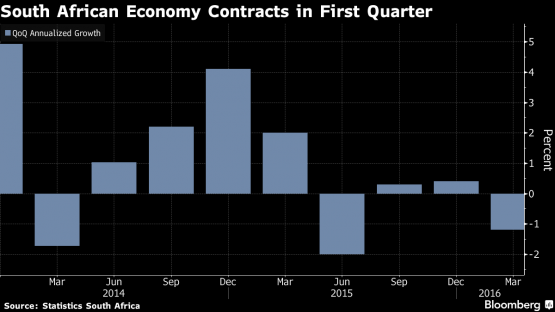
South Africa was spared a credit-rating downgrade to your second time this month Wednesday, helping shore up investor sentiment using a worse-than-expected economic slump while in the first quarter.
Fitch Ratings retained a stable outlook on South Africa’s BBB- long-term forex rating, the best investment-grade level, saying concerns about slow growth, significant fiscal and external deficits as well as debt levels were balanced by strong policy institutions, deep local capital markets and also a favourable government debt structure. S&P Global Ratings affirmed its BBB- level having a negative outlook on June 3, while warning it would cut the country to junk unless measures were arrive at bolster growth. S&P is scheduled to examine its rating again in December while Fitch hasn’t yet indicated whenever it will work its next assessment.
The Fitch announcement came close following national statistics office said gdp contracted an annualised 1.2% within the first quarter, in comparison to a 0.4% expansion in the last three months. The median of 21 economist estimates composed by Bloomberg was for a 0.1% contraction.
“We didn’t expect Fitch to downgrade us, but we expected an outlook switch to negative,” Johann Els, an economist at Cape Town-based Old Mutual Investment Group, said on the phone. “That may be a positive surprise. I cannot obtain downgrading in December.”

The rand gained against the dollar and bonds advanced following the Fitch announcement. The currency strengthened 1.04% to 14.7597 per dollar by 23:40?in Johannesburg, erasing a decline of up to 0.5% following the discharge of the GDP data. Yields on benchmark rand bonds due December 2026 dropped five basis suggests 9.05%.
A downgrade to sub-investment grade to your continent’s most-industrialised economy could prompt forced selling by a few funds that will be prevented by their mandate from owning junk-rated securities.
Budget Deficit
Finance Minister Pravin Gordhan pledged in their February budget to narrow the fiscal deficit to two.4% of gdp by 2019, from three.9% not too long ago, and limit gross debt to 50.5% of GDP in 3 years by lessening spending and raising taxes. His task is complicated by an economy that’s set to expand just 0.6% in 2010, the slowest pace since a 2009 recession, based on the central bank.
The World Bank cut its 2016 growth forecast for Nigeria to 0.6% from 0.8% on Tuesday, saying low business confidence and political tensions are slowing investment growth. Fitch projects the economy will expand 0.7% in 2010 and 1.5% in 2017.
Achieving fiscal targets “will be challenging seeing that GDP growth may well underperform,” the ratings company said. “Pressures to get expenditure are rising on account of increasing disaffection with poor public-service delivery.”
The government is “mindful” of your risks Fitch highlighted and subsequently month or two are essential to enhance the economy, the Treasury said within a e-mailed statement. Gordhan and President Jacob Zuma have met with business and labor leaders to come up with measures to increase output and confidence.
‘Sustainable Path’
“The decision affords Africa a narrow window to signify further concrete implementation of reforms that are already underway directed at turning about the growth path as well as put public finances at a more sustainable path,” the Treasury said.
Farming output contracted by an annualised 6.5% in the ninety days through March, your fifth consecutive quarter of decline, while mining shrunk by an annualised 18.1%, facts office said in the report released in Pretoria, the funding. The transport industry entered a recession during the with three months through March and declined by an annualised 2.7%.
“The news with the negative GDP print is tempered somewhat by Fitch’s almost simultaneous affirmation of South Africa’s investment-grade rating,” Razia Khan, head of Africa macro research at Standard Chartered working in london, said within an e-mailed note. “Despite this seeming reprieve, you will encounter broad realisation that improved growth performance is needed for South Africa to retain investment grade.”
? 2016 Bloomberg
